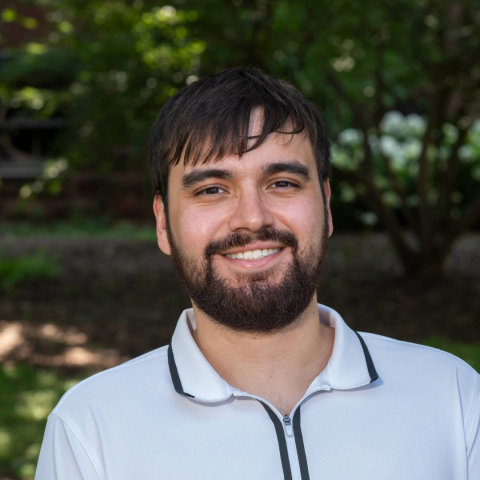McNair Scholar 2024 - Justin Gonzalez
Justin Gonzalez graduated from the University of Minnesota, Twin Cities in 2023 and majored with a B.S. in Biochemistry. His interests focus on assay development for post-translational modifications and HPLC method development. Justin plans on pursuing a Ph. D in Biochemistry.
Quote from Justin Gonzalez

My dream is to work in research and development for a pharmaceutical or biotechnology company contributing to the development of novel therapeutics.
Research project
Characterizing Computationally designed TAM Family Kinase Substrates
ABSTRACT
Various receptor tyrosine kinases (RTKs) have been associated with pro-oncogenic activity in cancer cells. Tyro3, Axl and Mer (TAM) are a family of understudied RTKs. Abnormal expression has been observed for the TAM RTKs in various cancers and is believed to support cancer cells with increased survivability. As to date there are no FDA approved inhibitors for any of the TAM RTKs. We attempted to computationally design substrates, built off our previous work, to enhance TAM substrate phosphorylation through the assistance of artificial intelligence. We utilized AlphaFold2 to predict interactions between substrate and kinase conformations accommodating substrate compatibility. AlphaFold2 predictions were used with ProteinMPNN (an AI-based protein design tool) resulting in generated substrate sequences that were based on the kinase-substrate interactions. Molecular dynamic simulations were conducted with Amber to refine the predictions. This resulted in novel peptide sequences that underwent kinetic characterization. Our results suggest that computational design of substrates is possible from existing substrates’ kinase active site interaction models, however we have not yet been able to determine a clear structure-function correlation to aid in understanding the principles underlying the kinase-substrate selectivity between TAM RTK family members. Resulting computational design could be used to improve kinase-substrate compatibility and specificity, if such correlations can eventually be identified.
Faculty mentor
Dr. Laurie Parker is the Associate Dean for Undergraduate Education and Professor for Biochemistry, Molecular Biology and Biophysics in the College of Biological Sciences at the University of Minnesota Twin Cities. Dr. Parker attended the University of Glasgow where she received her Ph. D in synthetic organic chemistry in 2003. Her research focuses on assay development for post-translational modifications, with an emphasis on protein phosphorylation, using chemical biology and proteomics to develop tests that could improve inhibitor drug screening for cancer treatment. Dr. Parker has published in numerous journals such as the Journal of American Chemical Society as well as presented at numerous conferences such as US HUPO.